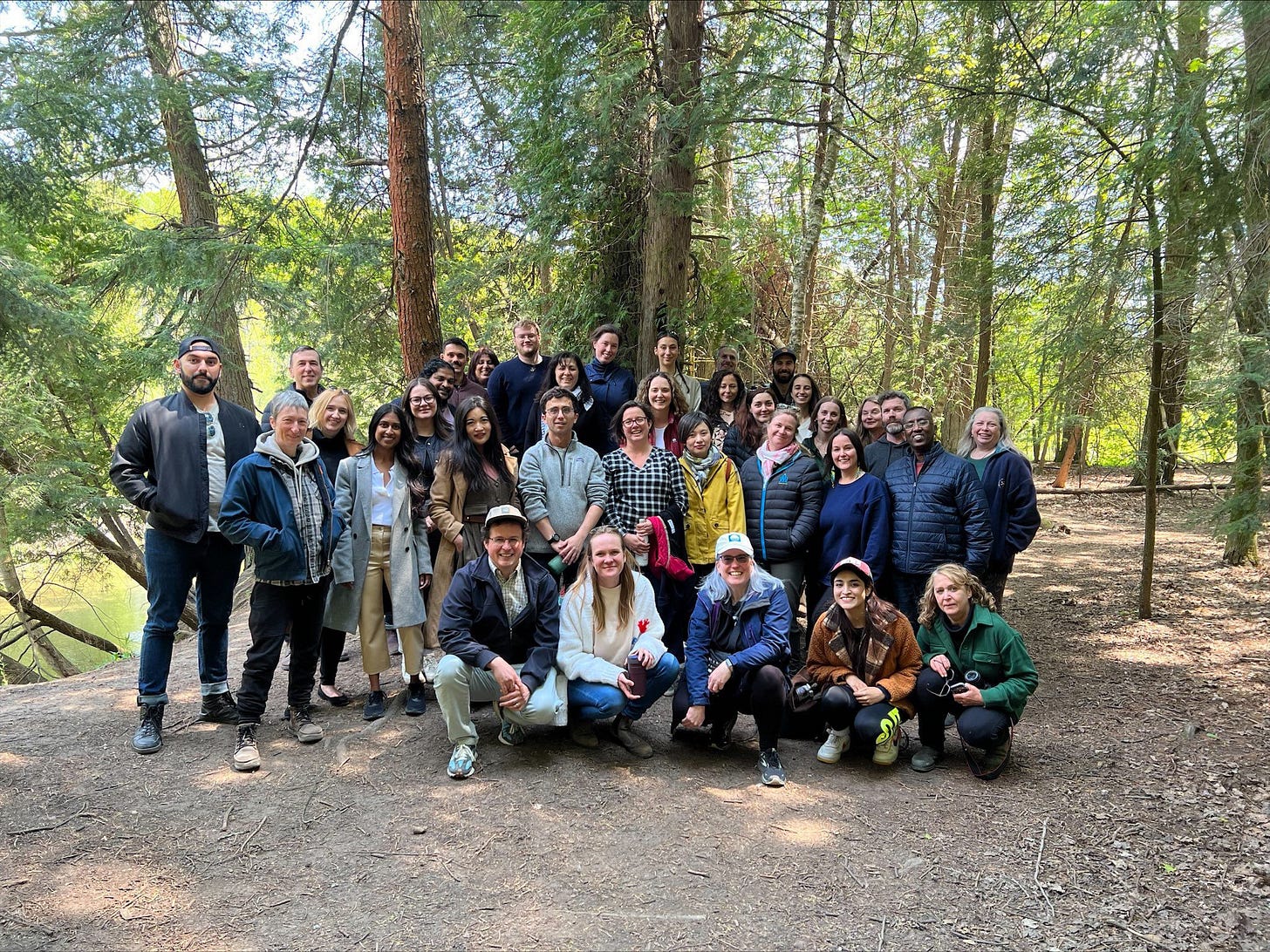Environmental Defence team Credit: Environmental Defence website
Ashley Wallis is Associate Director at Environmental Defence. She provides strategic leadership and oversight for campaigns designed to end plastic pollution, kick out toxics and safeguard freshwater in Canada.
On Small Change today, Ashley and I discuss why using the storm water sewer system should never be part of a legitimate business plan.
Our conversation started after a popular local barbecue cleaning service arrived on my street in late June. After thoroughly cleaning the appliance, the service person crossed the street and dumped a large pail of black liquid down the sewer in front of my home.
Having worked in various restaurants, I knew that restaurants are required to hire a company that specializes in cooking grease disposal so it doesn’t end up in either the storm water or sanitary sewer system.
But instead of driving the sludge to the municipal waste management site to drop it off at the hazardous waste facility or hiring a private company to properly dispose of it, the mixture was poured into the storm sewer.
And, that is a real concern because this company services Halton, Peel, Hamilton and Guelph.
In most municipalities, hazardous waste entering storm sewers doesn't get filtered at a wastewater treatment plant before entering streams, rivers and lakes.
That hazardous waste can create an unhealthy environment for aquatic animals like fish. This pollution can also affect water quality and result in unsafe drinking water.
Businesses and individuals should take household hazardous waste to one of the more than 100 municipal collection sites or 300 municipal collection events across the province. The hazardous waste will be recycled where possible and safely disposed of for free.
Ashley and I discuss why the practice of putting grease, fats and cleaning chemicals down the storm water sewer system should never be part of a legitimate business plan.
I did contact Ontario Ministry of the Environment, Conservation and Parks (MOE) to let them know about the situation and to share photos of the incident.
An agent took the information and assured me that they would contact each municipality where the business operated and send them my photos as well.
I was told that the Ontario MOE would not follow up with me, but the agent assured me he would request that each municipal MOE follow up to let me know how, and when, the issue was resolved.
Eleven days after reporting the incident to Ontario MOE, a Burlington Parks and Rec truck pulled up outside my home. One worker removed the sewer grate, looked down and said there was nothing to see.
There had been two torrential rain events in the intervening time which washed away any proof. When I showed the workers my photos, they told me they would come back to my home if they needed more information or the photos. They didn’t ask for my photos or take my contact information.
On September 3, 2024, I followed up with the municipal MOEs in Halton/Peel, Hamilton and Guelph. I was told that Halton had closed the file because there was nothing to see. They did not have my photos. And, basically, I was told there was not enough staff to look into dumping events like the one I described.
Guelph could not find the event number I provided via email and phoned me to get more information. That representative was very receptive, asked for the photos and said she would contact Burlington to encourage them to look into the incident further.
Later that same day, the Halton/Peel MOE representative phoned back to say that their office had decided that since the barbecue cleaning company was based in Hamilton, Hamilton MOE should deal with the dumping.
The agent then told me to contact Hamilton. I suggested he do that since he knew exactly who should be contacted and asked to be copied on the email. I was copied on that email and was later told by Hamilton MOE via email that I needed to deal with their public relations department going forward.
Surprisingly, on Sept. 18 a representative from Ontario MOE phoned to say the owner of the barbecue cleaning company had been contacted and the owner had assured the provincial MOE that employees are instructed to scrape down each barbecue before cleaning with solvents. Whatever solids are scraped off of the barbecue are to be disposed of as part of the regular garbage collection.
The owner also said employees are instructed to pour the pail of organic cleaning solutions used to clean the barbecue onto a grassy area on the property so it can disperse.
The owner assured the provincial MOE that he will speak with his employees next season. However, there will be no further follow-up from the provincial MOE.
Ashley and I discuss this less than enthusiastic response from provincial and municipal MOE representatives. We also discuss why are businesses like this one are pouring cleaning products onto grass, or in this case, down the storm sewer, rather than taking them to a waste management site or hiring a disposal company.
Cleaning products and grease are not the only things that have been purposely put down the sewers in my neighbourhood over the years.
Salinated water from pools and hot tubs is routinely dumped directly into the sewer despite Burlington’s water and stormwater site stating saltwater needs to be disposed of via the sanitary sewer system by draining it down a sink or toilet. Other alternatives include draining saltwater onto the property owners’ surrounding lawn or having the water hauled away by a Ministry of the Environment and Climate Change approved and licensed company.
Chlorinated pool and hot tub water should be drained across the property owners’ lawn after being dechlorinated to as close to zero as possible.
In fact, the Burlington web site encourages folks to report the release of untreated pool water into a stream, river, lake or storm sewer system and provides MOE, city and regional contact information.
Yet, it remains a given that every fall pools and hot tubs are drained directly onto the street and into storm sewers and again, in the spring dirty water from pool covers and remaining pool water will go directly into the sewer system as well.
Gasoline siphoned from a lawn mower at the end of the season has been placed down the sewer as well as weeds pulled from grass lawns, leaves blown from lawns and driveways, and countless cigarette butts by homeowners who smoke at the front of their homes.
Ashley and I discuss why all of these practices should be discouraged.
On September 25, I followed up with Hamilton MOE to ask about the impacts dumping hazardous materials has on sewer infrastructure, streams, rivers and lakes, as well as the animals and plant life that depend on those water sources.
I was told by the public relations department that since the spill occurred in Burlington I should contact Halton/Peel MOE regarding any infrastructure questions.
This episode aired on December 5 and I’m still waiting for a reply from Halton/Peel MOE despite follow-up inquiries.
Luckily, Ashley is able to tell Small Change listeners about the infrastructure and environmental costs of improper sewer dumping and those impacts and costs will blow your mind!
For over 40 years, Environmental Defence has worked with all levels of government, industry and individuals to safeguard Canada’s freshwater, create livable communities, decrease folks’ exposure to toxic chemicals, end plastic pollution, tackle climate change and build a clean economy.
The Environmental Defence website states, the Great Lakes hold over 20 per cent of the world’s surface freshwater, provide drinking water for millions of people, support billion-dollar economies, and are the foundation of the region’s ecosystem.
Yet, those lakes are threatened by toxic algae blooms, climate change, and plastic pollution.
Have a listen to this important podcast to find out about some of the crucial fresh water campaigns Environmental Defence is currently working on.
Official City of Burlington information on what not to put down drains and stormwater sewers.
Official City of Burlington site regarding household hazardous waste.
Biggest Little Farm is available free on CBC Gem or arrange a community screening by contacting the creators at Apricot Lane Farms.
Find out more about biodynamic farming here.
Thanks to everyone who read today’s article and listened to my podcast. With your continued support, a little Nicoll can make a lot of change.
Music: Real Estate by UNIVERSFIELD is licensed under a Attribution 4.0 International License. freemusicarchive.org.
*Be sure to download the Substack app to get the most from your podcast













Share this post